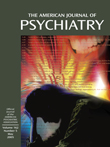Abstract
OBJECTIVE: Although there have been case reports suggesting a relationship between treatment with the acne medication isotretinoin and the development of depression and suicide, this topic remains controversial. In order for isotretinoin to cause depression, it must have an effect on the brain; however, the effects of isotretinoin on brain functioning in acne patients have not been established. The purpose of this study was to assess the effects of isotretinoin on brain functioning in acne patients. METHOD: Brain functioning in adults was measured with [18F]fluorodeoxyglucose positron emission tomography before and after 4 months of treatment with isotretinoin (N=13) or an antibiotic (N=15). RESULTS: Isotretinoin but not antibiotic treatment was associated with decreased brain metabolism in the orbitofrontal cortex (–21% change versus 2% change for antibiotic), a brain area known to mediate symptoms of depression. There were no differences in the severity of depressive symptoms between the isotretinoin and antibiotic treatment groups before or after treatment. CONCLUSIONS: This study suggests that isotretinoin treatment is associated with changes in brain functioning.



